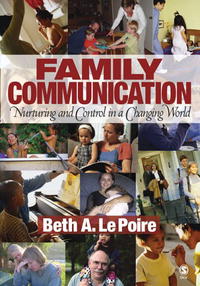Family Communication organizes the study of family communication around the concepts of nurturing and control which allows the consideration of communication in all family relationships within all family forms.A The concepts of nurturing and control allow us a unique frame by which to organize the traditional developmental factors of relationship development, marriage, adding children, and raising socio-emotionally competent children.A In addition, the concepts of nurturing and control allow us to understand the uniquely communicative family features of intimacy and conflict and their relationship to marital and family satisfaction.A Further, nurturing and control are evident in families which include violence, substance abuse, eating disorders and depression.A
Key Features:
- Inclusive treatment of ALL family forms:A traditional nuclear; non-traditional nuclear (i.e., working moms); bi-nuclear families (families where children live in two homes with one biological parent and one non-biological parent); cohabitation, single-parent households; step-family and blended configurations; gay families; couples with no children; and extended families
- Explores the forces—governmental, religious, media influences, and social science research—that cause us to assume most families are traditional and nuclear, using biological, legal, and sociological definitions
- Organizing theme and theories:A Roles theory, family systems theory, and rules theory are used throughout, using the organizing scheme of nurture/control so students can better understand, relate to, and apply the material
- Unique material:A Development of parental attachment is fully discussed, showing how nurturing and controlling communication processes encourage socio-emotional competence in children
- Unique material:A The explication of a new family communication theory called Inconsistent Nurturing as Control Theory, which explores the ways in which family members attempt to change the undesirable behaviors of a particular family member (e.g., substance abuser, eating disordered individual, gambler, depressed person, violent individual) through their use of nurturing as control
